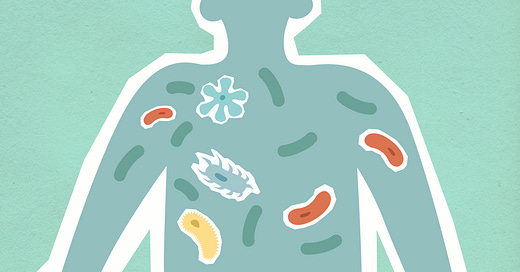Are We Humans or Metaorganisms?
We feel like an individual, but really, an ecosystem of organisms influence who we are far more than we realize
Hiya!
Gut health has been a trending topic over the last few years, especially since scientists became aware of the relationships between our gut and brain, and our gut health and overall health. The topic has also made its way into contemporary lifestyle magazines with articles about which superfoods you should eat to maximize your gut health.
This is all well and good, but while we buy our kale and Greek yogurt, scientists continue to learn even more about our guts and the trillions of microbes that call our guts home. And what they’re discovering shows these microbes do far more than we ever thought possible. By the time you finish reading this, you’ll likely never think of your microbiome the same way.
Microbiome
A lot (but not all) of what I’m sharing with you today comes from an in-depth feature cover story I stumbled upon, written by a team of New Scientist writers. The writing team, Rowan Hooper, Clare Wilson, Alison George, Grace Wade, Alice Klein, and Michael Le Page, go into far more detail about the microbiome and general gut health than I am today — which is saying something because this letter is a long one. So, I encourage you to read it fully if you want to know more.
But let’s just say that until recently, experts thought three primary distinct parts of a person reflect solid elements of an individual self — the central nervous system, the genome, and the immune system. Now, scientists think perhaps our microbiome should be added to the list.
The United States National Institute for Environment Health Sciences defines the microbiome as “the collection of all microbes, such as bacteria, fungi, viruses, and their genes, that naturally live on our bodies and inside us.” Bacteria are the best studied within this community, though.
Scientists estimate roughly 500 to 1,000 species of bacteria exist in the human body at any given time. For a while, it was thought they outnumbered Human cells ten to one, but research in 2016 debunked this myth. Other research provides a more specific estimate:
Thoroughly revised estimates show that the typical adult human body consists of about 30 trillion human cells and about 38 trillion bacteria.
Your microbiome influences how your brain works and grows, affects your feelings and personality, and directs your immune system. Speaking of, between 70 and 80 percent of our immune cells live in our gut, communicating and coordinating with our other gut microbes.
Together, they strengthen our immune responses to help fight disease. One of their most important roles is to regulate our body’s first line of defense against infection — our inflammation response. Controlling inflammation is vital because too much inflammation can damage cells and help spur chronic illnesses.
But perhaps the most exciting thing I’ve learned about our microbiome is that they produce many of the same neurotransmitters made in the brain. Research shows the gut microbiome helps regulate brain function, including behaviors related to anxiety and depression. Meanwhile, other research suggests certain neurotransmitters our microbiome creates could influence our behavior, such as choosing what to eat.
Keep reading with a 7-day free trial
Subscribe to Curious Adventure to keep reading this post and get 7 days of free access to the full post archives.



